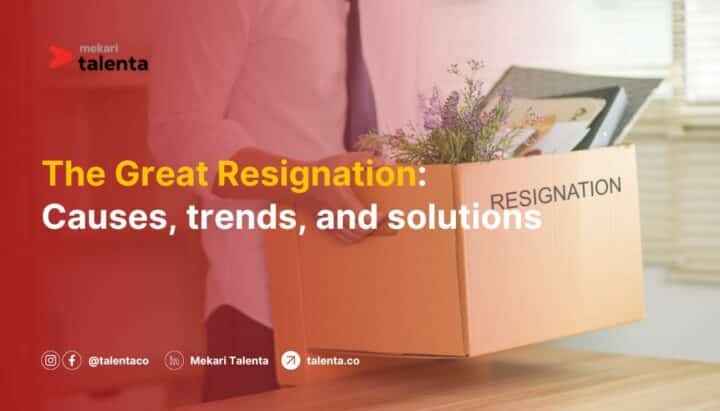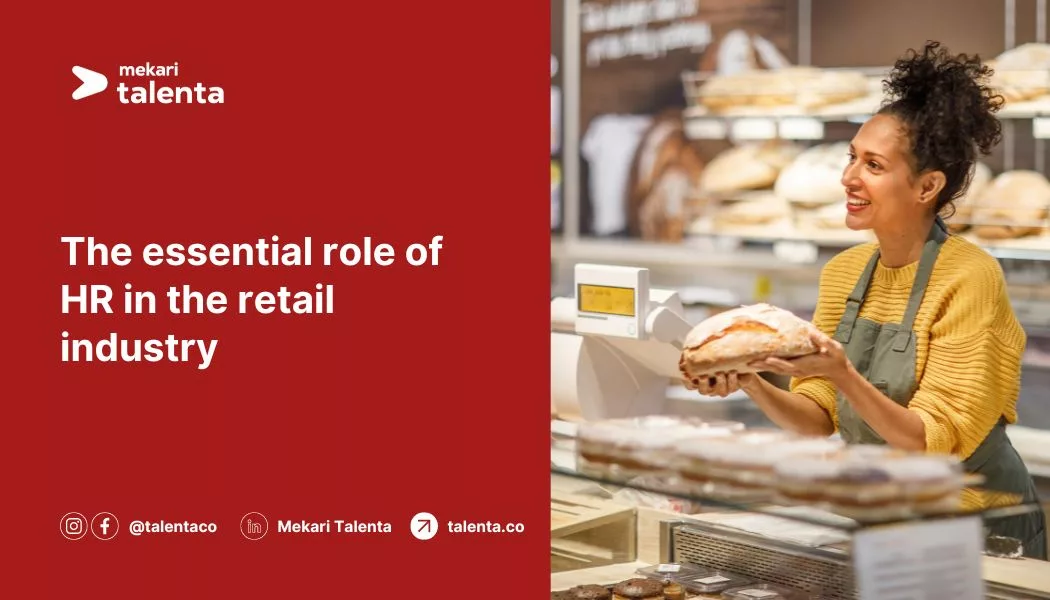The year 2022 showed the biggest number of people quitting their jobs in the United States. This phenomenon is called The Great Resignation which in America, a mass of employees voluntarily resigned from their jobs.
This phenomenon began in early 2021 in the middle of Covid-19 pandemic and happened not only in the US but also in the Southeast Asia region as well, although it’s not as massive. A survey was done on more than 2.600 workers in more than 1.100 companies around six countries in Southeast Asia. In Indonesia, around 77% of professional workers were thinking about resigning.
This mass resignation was sparked by many reasons, including wage stagnation, higher cost of living, bad working environments, lack of benefits, job dissatisfaction, and many more.
The Great Resignation also impacted many industries where most of them actually came from hospitality, healthcare, and education sectors.
Understanding the Great Resignation
In the US, there are more than 50 million workers who resign from their jobs in 2022. This marks a record breaking from the previous year where the phenomenon began.
This phenomenon was particularly prominent during the COVID-19 pandemic, but its effects extended beyond the immediate crisis.
These majority of people who resigned from their jobs wanted to take other opportunities. They had optimism on their ability to find a new promising job.
This competition then has made employers increase offering salary, especially for new hires who switched jobs. In addition, remote work has also given opportunities for these workers and given them more flexibility.
These elevated numbers of people who resigned is in line with the rising number of job openings, driving resignations and competition. The US also marked a record 76.4 million people being hired in 2022.
Examples of the Great Resignation
Here are some examples of impact from The Great Resignation on industries.
The Great Resignation in education
The Great Resignation has not only led to a shortage of educators but has also caused staffing challenges across various departments within schools. As an example, a shortage of bus drivers in the US can waive certain requirements of a commercial driver’s license to attract more applicants.
Educators, including teachers and other school staff, have encountered unexpected and abrupt transitions to remote learning, heightened risks of COVID-19 exposure during in-person teaching, and insufficient resources.
These circumstances, among others, have prompted some educators to question the long-term sustainability of their teaching careers. Some of them were contemplating an early departure from their profession due to the stressors brought about by the pandemic.
In response to the shortages in staff, certain schools are shifting towards online learning.
The Great Resignation in air travel
In the initial months of the pandemic, approximately 400,000 airline workers received notifications indicating the possibility of job loss.
Although air travel has mostly resumed, especially during the 2021 holiday season, numerous individuals who were previously employed by airlines have opted not to return to their positions.
The decision to refrain from rejoining the air travel workforce can be attributed to the rise in disruptive and unfriendly behavior among air travelers, the ongoing risk of coronavirus exposure, and a shortage of hotel accommodations for pilots and flight attendants. The emergence of Covid-19 variants such as omicron has further intensified operational challenges for airlines, resulting in frequent cancellations.
The Great Resignation in healthcare
Healthcare workers have been facing unparalleled conditions since the 2020 pandemic, and these challenging circumstances appear to be persisting.
Given the significant risk of Covid-19 exposure, extended working hours, inadequate access to crucial personal protective equipment, and the emotional toll of encountering mass fatalities, it is unsurprising that healthcare professionals are leaving the profession in unprecedented numbers.
The gravity of the situation prompted the passing of a bill in the US’ House of Representatives in December 2021, aimed at providing healthcare employees with training to address issues such as suicide, burnout, mental health conditions, and substance use disorders.
The Great Resignation in hotels and accommodations
Being the sector with the highest resignation rate, surpassing the national average by more than twice as of September 2021 in the US, employees in hotels and accommodations constitute a significant portion of lower-wage, customer-facing workers leaving their positions across various industries.
This group also endured a substantial impact from layoffs at the onset of the pandemic. Owing to a shortage of staff and the increasing popularity of alternative accommodation services like Airbnb, numerous hotels either had to close down or are unable to operate at full capacity.
Despite the accommodations industry’s trend of offering higher wages for traditionally lower-paid positions to attract candidates, concerns related to frontline work and a perceived lack of meaningful changes within the industry are discouraging former hospitality professionals from rejoining these roles.
Common reasons behind the Great Resignation
One of the reasons behind the rise of resignation in the US were low salary and a lack of career opportunities, suggesting there are better offers from other companies.
Other reasons may also linked to the Covid-19 pandemic, such as:
- Some individuals, reflecting on their pandemic experiences, reconsidered their life priorities, leading them to cut down on working hours or exit the labor force altogether.
- Employers, after permitting remote work in 2020, insisted that employees return to the office.
- Workers departed their jobs due to mistreatment by employers and customers during the pandemic, seeking alternatives that became available.
- The recovery of the labor force participation rate from pandemic lows has been sluggish, intensifying the competition for workers.
- Some individuals left their jobs either because they couldn’t secure childcare as schools transitioned to remote learning or simply because they refused to comply with workplace Covid-19 vaccination requirements.
Tips to prevent the Great Resignation
Preventing the Great Resignation”or mitigating its impact involves addressing key factors that contribute to employee dissatisfaction and turnover. Here are several strategies that organizations can consider:
Employee engagement
- Foster a positive and inclusive work environment that values diversity and promotes a sense of belonging.
- Provide opportunities for professional development and growth to keep employees engaged and motivated.
Flexible work arrangements
- Offer flexible work schedules and remote work options to accommodate the changing expectations around work-life balance.
- Ensure that communication channels remain open and effective for remote or hybrid teams.
Competitive compensation and benefits
- Regularly review and adjust salaries to remain competitive in the job market.
- Offer attractive benefits packages, including health insurance, retirement plans, and other perks that align with employees’ needs.
Mental health support
- Implement mental health programs and support systems to help employees manage stress and avoid burnout.
- Encourage a culture that destigmatizes mental health discussions and promotes seeking help when needed.
Recognition and rewards
- Acknowledge and appreciate employees for their contributions through recognition programs.
- Provide tangible rewards and incentives to show appreciation for hard work and dedication.
Feedback and listening mechanisms
- Establish regular feedback mechanisms, such as surveys or town hall meetings, to gauge employee satisfaction and gather insights.
- Act on feedback to demonstrate a commitment to improvement and responsiveness.
Ultimately, the key is to create a workplace culture that prioritizes employee well-being, growth, and engagement.
Regularly assessing and adapting organizational policies to align with employee needs and expectations can go a long way in retaining a talented and satisfied workforce.
One of the thing that can improve your workplace is by having a better system, for example using HRIS software like Mekari Talenta. Mekari Talenta has some features that can improve employee engagement in the workplace, like a better onboarding experience through Advanced Recruitment feature.
Learn more about Mekari Talenta by discussing your needs with our teams and try the app demo for free.









